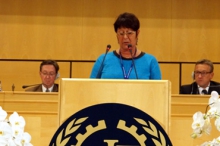PSI leader's presentation at the ILC

Public Services International
ILC 2014 – Statement by GS Rosa Pavanelli
Director General, esteemed delegates,
We welcome your report that presents an ILO Agenda on Fair Migration. The ILO’s rights-based approach and the principle that “labour is not a commodity” included in the Declaration of Philadelphia are the cornerstones for setting that ILO agenda.
We all recognise that international migration today is essentially about people leaving their homelands in search of work and a better life. Today, not only do we face an economic crisis, we have a global jobs crisis, characterised by high youth unemployment and an alarming rise in precarious work.
A large proportion of precarious workers are migrants, women and young workers with low wages and without access to social benefits
Austerity measures and global competition continue to grip jobs and public services. Among the millions who lost their jobs, many are workers involved in the delivery of public services, especially women.
Poor funding and lack of access to quality public services are perpetuating poverty and a push factor to migration. At the same time, cuts in public services in countries of destination are disproportionately affecting migrants, depriving them of access to social protection, health, education and social services.
Scapegoating and the rise of racism and xenophobia are further exacerbating migrants’ condition.
Inclusive policies are the right measures to improve the working and living conditions of workers regardless of their migration status. We need to guarantee trade union rights, regularise undocumented workers, fight precarious work and empower women migrants and young workers.
The impact of skilled migration is a particular challenge, as evident in the health and care sectors.
Migrant workers cannot be seen as the panacea to fill labour market shortages or respond to demographic changes.
Migrant remittances are neither an answer to development nor an appropriate policy for poverty reduction.
Free circulation of workers in regional processes are best determined through social and tripartite dialogue and governed by rights-based multilateral agreements covering recruitment, rights at work, recognition of qualifications, portability of social security, and integration and reintegration policies.
We want to see the ILO taking an assertive and proactive role in ensuring that migrant workers, regardless of status, have access to justice and redress.
The ILO has to take up a leading role to ensure incorporating migration in the post-2015 Agenda within the goals of (1) Decent work and full employment, (2) Universal social protection and (3) Gender equality and empowerment of women.
Allow me to make some comments on the ongoing Conference.
We are pleased with the conclusions of the recurrent discussion on employment, that underline the need for complementarity and coherence between public policies and services and the private sector in the promotion of decent employment, while acknowledging the important role of public sector employment.
The discussions in the CAS reflect the all-out attack on trade unions in the public sector. We are concerned that Guatemala and Turkey were not included in the list.
Governments align with international financial institutions to dismantle labour relations where it will hurt most for future generations.
While some countries are exporting their anti-social and anti-workers models, global supply chains and secret trade agreements are also pushing workers’ rights out of reach for millions of workers.
This race to the bottom has to stop. People’s lives are worth more than profits!
It is not by reducing workers’ rights that we will overcome the current crisis. We strongly refute the suggestion that limitations to collective bargaining are acceptable in any circumstances and we call on governments and employers to act in good faith.
Indeed, some countries that have come out of the crisis with less inequality are examples of how collective bargaining and income distribution policies lead to economic recovery and social inclusion. Let us work together for this alternative built on trust and dialogue.
As Public services unions we are very much committed to protect citizens and users by ensuring they always have access to quality public services, included through regulating essential services.
But when a conflict persists workers have only one democratic means to be heard: the strike.
Director-General, the right to strike is not negotiable.
Thank you.

